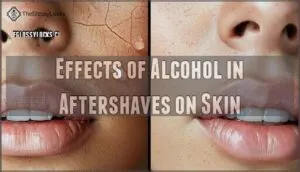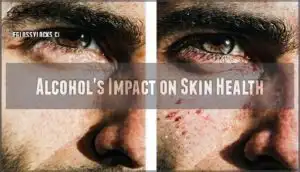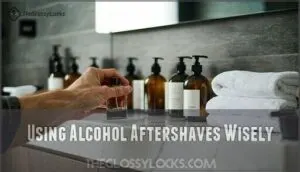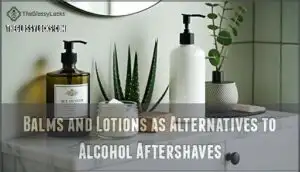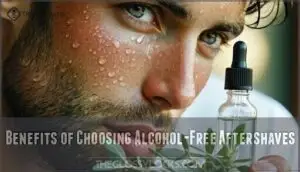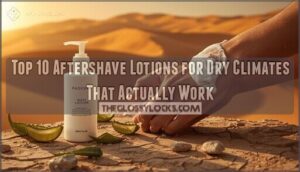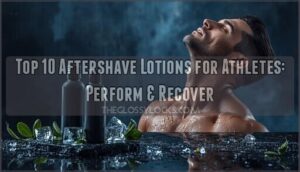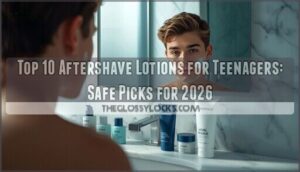This site is supported by our readers. We may earn a commission, at no cost to you, if you purchase through links.
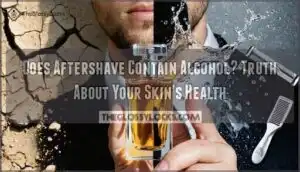
You’ll find these same ingredients in hand sanitizers and rubbing alcohol. The alcohol kills bacteria on your freshly shaved skin and creates that familiar sting.
However, this antiseptic benefit comes with a trade-off. Alcohol can dry out your skin and cause irritation, especially if you’ve got sensitive skin.
Think of it like putting rubbing alcohol on a cut – effective but harsh. Many guys are switching to alcohol-free alternatives like balms and lotions that soothe without the burn.
Understanding which type works best for your skin makes all the difference.
Table Of Contents
- Key Takeaways
- Does Aftershave Contain Alcohol?
- Types of Aftershaves With Alcohol
- Alcohol-Free Alternatives for Aftershave
- Effects of Alcohol in Aftershaves on Skin
- Alcohol’s Impact on Skin Health
- Using Alcohol Aftershaves Wisely
- Balms and Lotions as Alternatives to Alcohol Aftershaves
- Reasons to Avoid Alcohol in Aftershaves
- Benefits of Choosing Alcohol-Free Aftershaves
- Frequently Asked Questions (FAQs)
- What is alcohol based aftershave?
- Are alcohol based aftershaves safe?
- Do aftershave gels contain alcohol?
- Does a non alcohol based aftershave irritate your skin?
- Does a transparent aftershave contain alcohol?
- Do aftershaves have alcohol?
- Is alcohol-free after shave better?
- Does Gillette aftershave gel contain alcohol?
- Does Creed aftershave contain alcohol?
- Why use alcohol after shave?
- Conclusion
Key Takeaways
- Most traditional aftershaves contain 60-75% alcohol – You’ll find isopropyl or ethyl alcohol in classic formulations that provide antiseptic protection and that familiar sting, but this can dry out and irritate your skin over time.
- Alcohol strips your skin’s natural oils and disrupts its protective barrier – While it kills bacteria effectively, you’re trading short-term disinfection for potential long-term damage, including dryness, irritation, and accelerated aging.
- Alcohol-free alternatives deliver the same benefits without harsh side effects – You can choose from balms, lotions, witch hazel products, or aloe vera gels that soothe and protect your skin while preventing infections naturally.
- Your skin type should determine your aftershave choice – If you’ve got sensitive skin, eczema, or experience persistent irritation, you’ll benefit more from alcohol-free options that moisturize and heal rather than sting and dry out your face.
Does Aftershave Contain Alcohol?
Since you’re wondering about aftershave and alcohol, here’s the straight answer: most traditional aftershaves contain alcohol. The alcohol percentage in these products typically ranges from 60-75% in classic formulations, making them potent antiseptics that kill bacteria on freshly shaved skin.
Old school aftershaves rely heavily on alcohol in aftershave formulations because it provides that familiar sting and cooling sensation. However, modern artisanal aftershaves often explore different product forms – from alcohol-free balms to natural alternatives that won’t disrupt your skin microbiome.
You’ll find aftershave alcohol content varies dramatically across brands. While some swear by the traditional burn, others question is alcohol bad for skin long-term. The reality? Your skin’s needs should guide your choice. If you’ve got sensitive skin or want gentler care, alcohol-free options deliver effective results without the harsh bite.
Types of Aftershaves With Alcohol
Aftershave products come in various alcohol-containing formulations, each with distinct characteristics and uses. Understanding these differences helps you make informed choices for your skin care routine.
Traditional aftershave splashes typically contain the highest alcohol concentrations, often featuring denatured alcohol as their primary ingredient. These "Old School" formulations provide that classic cooling sensation many users expect.
Lotion alcohol content varies substantially, with most containing 60-75% alcohol for antiseptic benefits. Balm alcohol content tends to be lower at 2-5%, making them gentler options that still offer some disinfection properties.
Clinical studies suggest alcohol is less damaging than soap.
Here are common alcohol-containing aftershave types:
- Splashes – High alcohol content with instant cooling effect
- Lotions – Moderate alcohol levels with added moisturizers
- Gels – Alcohol-based with thicker consistency
- Pastes – Dense formulations with concentrated alcohol
- Specialty treatments – Targeted solutions for specific skin concerns.
When examining aftershave ingredients, alcohol appears prominently in most traditional formulations, though concentrations vary by product type.
Alcohol-Free Alternatives for Aftershave
While alcohol-based products dominate the market, you don’t have to endure the sting and dryness.
Alcoholfree aftershave options deliver the same protective benefits without harsh side effects. These natural aftershave alternatives work brilliantly for sensitive skin and provide superior hydration.
Here are four top aftershave alternatives to explore:
- Hydrating Balms: Rich formulas with shea butter that moisturize deeply while soothing razor burn and irritation.
- Witch Hazel Products: This natural astringent tightens pores and reduces inflammation without alcohol’s burning sensation.
- Aloe Vera Gels: Cooling and healing properties that reduce redness while providing natural antimicrobial protection.
- Essential Oils Blends: Tea tree or jojoba oil-based formulas that prevent infection while nourishing your skin naturally.
These natural ingredients offer gentler care that won’t compromise your skin’s health or comfort after shaving. You can also explore options for customizing fragrances by adding essential oils.
Effects of Alcohol in Aftershaves on Skin
Now that you know your options beyond traditional formulas, let’s examine what alcohol actually does to your skin.
When you apply alcohol-based aftershave, you’re getting powerful antiseptic action that kills bacteria and prevents infections in tiny cuts. The alcohol cooling sensation you feel happens as it evaporates, temporarily tightening your pores.
However, there’s a trade-off. Alcohol skin dryness occurs because it strips away your skin’s natural oils and disrupts the protective barrier. This irritation and alcohol combination can worsen conditions like eczema or leave you with uncomfortable skin irritation that lasts hours.
The "burn" you experience isn’t just dramatic effect—it’s alcohol reaching nerve endings after shaving removes dead skin cells. Despite the burn, studies suggest alcohol acts antiseptic, preventing infections that can delay healing. While short-term antiseptic benefits are real, frequent use may contribute to long-term damage through collagen breakdown and increased oxidative stress.
Alcohol’s Impact on Skin Health
Understanding alcohol’s effects on your skin health reveals some uncomfortable truths about your daily grooming routine. Alcohol in aftershave doesn’t just sting—it fundamentally alters your skin’s protective barrier and accelerates damage over time.
Here’s what alcohol does to your skin health:
- Strips natural oils, leaving your face vulnerable and parched
- Triggers inflammation that can worsen existing conditions like eczema
- Disrupts your skin microbiome, reducing natural defenses against bacteria
- Accelerates aging through dehydration and collagen breakdown
- Increases irritation threshold levels, making your skin more sensitive
The alcohol absorption rate through freshly shaved skin magnifies these effects. Your face becomes a highway for harsh chemicals that cause immediate skin irritation and long-term effects you’ll regret later.
Essential skin care includes gentle cleansers to maintain a healthy skin barrier.
Alcohol and aging go hand-in-hand—each application dehydrates your skin’s outer layers, creating fine lines and dullness that make you look older than your years.
Using Alcohol Aftershaves Wisely
Smart application techniques can make all the difference when you’re using alcohol-based aftershave. Think of it like seasoning your food – a little goes a long way, and too much ruins the experience.
Like a fine whiskey, quality aftershave demands respect—use sparingly for maximum impact without the regret.
Start with patch testing on a small skin area before committing to regular use. Your skin type matters here. If you’ve got oily skin, you can handle stronger formulations, but sensitive skin needs gentler approaches.
| Application Method | Frequency of Use | Best For |
|---|---|---|
| Light dabbing motion | Once daily | Normal skin |
| Spray from 6 inches | Every other day | Sensitive skin |
| Palm application | After each shave | Oily skin |
| Cotton pad method | 2-3 times weekly | Dry skin |
Product strength varies substantially between brands. Start with lower alcohol concentrations around 40-60% rather than jumping into high-proof versions. Watch for aftershave side effects like excessive dryness or persistent skin irritation. If your face feels tight hours later, you’re overdoing it.
Balms and Lotions as Alternatives to Alcohol Aftershaves
While alcohol-based aftershaves serve their purpose, balm and lotion alternatives offer gentler care for your skin.
These products focus on hydration rather than harsh disinfection, making them perfect for sensitive skin types.
Balm Benefits include deep moisturization through ingredients like shea butter and vitamin E.
Lotion Hydration provides lighter, everyday comfort without overwhelming your pores.
Both aftershave types deliver Alternative Ingredients such as aloe vera and witch hazel for natural soothing.
A key advantage involves skin soothing properties.
- Balms contain nourishing oils that repair skin damage
- Lotions absorb quickly while preventing razor burn
- Natural formulas reduce irritation compared to alcohol-based products
Reasons to Avoid Alcohol in Aftershaves
Alcohol-based aftershaves can dry out your skin and cause irritation, especially if you have sensitive skin or conditions like eczema.
You’ll want to keep these potential drawbacks in mind before choosing an aftershave that contains high levels of alcohol.
Potential Skin Irritation
Your skin pays the price when alcohol-based aftershaves cause skin irritation like redness, burning, and peeling.
If you have sensitive skin, alcohol sensitivity, or conditions like eczema flare-ups and psoriasis concerns, these products can trigger razor burn and aftershave irritation.
The drying effects strip natural oils, making irritation worse and leaving you uncomfortable.
Hydration and Moisturization
Beyond irritation, alcohol in aftershave creates another problem: it strips away your skin’s natural moisture.
Think of alcohol as a thirsty sponge that soaks up everything, including the oils your skin needs. This drying effect leaves your face feeling tight and uncomfortable.
- Hydration benefits from alcohol-free products keep skin supple
- Moisturizing ingredients like glycerin replenish lost moisture naturally
- Balm effectiveness provides lasting comfort without stinging sensations
- Natural hydration supports your skin barrier function properly
- Skin hydration prevents premature aging and maintains healthy appearance
Sensitive Skin Considerations
People with sensitive skin face unique challenges when choosing aftershave products.
Alcohol in aftershave can trigger redness, burning, and uncomfortable stinging sensations. Product selection becomes essential for irritation prevention.
Patch testing helps identify ingredient sensitivity before full application.
Consider these options:
| Alcohol-Based Issues | Gentle Alternatives |
|---|---|
| Burning sensation | Alcohol-free balms |
| Skin dryness | Natural remedies with aloe |
| Increased redness | Fragrance-free formulas |
| Long-term irritation | Moisturizing aftershaves |
Choose aftershave for sensitive skin wisely.
Benefits of Choosing Alcohol-Free Aftershaves
You’ll find that alcohol-free aftershaves protect your skin’s natural moisture barrier while providing the same infection-fighting benefits through gentler ingredients like witch hazel and tea tree oil.
These alternatives reduce irritation, prevent long-term dryness, and work especially well if you have sensitive skin or existing conditions like eczema.
Hydrating Sensitive Skin Solutions
Alcohol-free aftershaves deliver gentle ingredients that truly moisturize sensitive skin without harsh stinging.
These balm benefits include natural hydration from oils like jojoba and sunflower seed, plus soothing ingredients like aloe vera and vitamin E.
Many users find specialized aftershave products beneficial for their skin.
They’re perfect for repairing damage while soothing irritation, making aftershave for sensitive skin both comfortable and effective for daily use.
Natural Soothing Alternatives
Many natural aftershave alternatives harness skin soothing power from gentle sources.
Aloe vera delivers cooling relief while witch hazel acts as nature’s astringent without harsh chemicals.
Essential oils like tea tree provide antimicrobial benefits, and herbal extracts from chamomile calm irritation.
Many prefer aloe vera options after shaving.
Honey benefits include natural healing properties, making these natural ingredients perfect for sensitive skin care.
Long-Term Skin Benefits
Alcohol-free aftershaves protect your skin microbiome while boosting collagen production for aging prevention.
You’ll notice improved skin health as these formulas support scar reduction and shield against sun damage.
Unlike harsh alcohol-based products, gentle alternatives maintain your skin’s natural barrier, delivering longterm benefits that keep your complexion resilient.
Your skin care routine becomes more effective without drying effects.
Frequently Asked Questions (FAQs)
What is alcohol based aftershave?
Traditional aftershaves pack a punch with 60-75% alcohol content.
You’re getting antiseptic protection, bacteria-killing power, and that familiar sting.
It disinfects cuts, tightens pores, but can dry sensitive skin out quickly, providing bacteria-killing power.
Are alcohol based aftershaves safe?
Alcohol-based aftershaves are generally safe for most people when used properly.
They effectively disinfect cuts and prevent infections.
However, you should avoid them if you have sensitive skin, eczema, or experience persistent irritation.
Do aftershave gels contain alcohol?
Picture smoothing gel across your freshly shaved face.
Most aftershave gels do contain alcohol, but typically less than traditional splashes.
You’ll find alcohol percentages ranging from 10-40%, making them gentler while still providing antiseptic benefits.
Does a non alcohol based aftershave irritate your skin?
Non-alcohol aftershaves typically won’t irritate your skin since they’re formulated with gentler ingredients like witch hazel, aloe vera, and moisturizers. You’ll likely experience soothing relief rather than stinging or dryness.
Does a transparent aftershave contain alcohol?
A transparent aftershave can contain alcohol, but you can’t tell just by looking. Check the ingredient list for ethyl alcohol, isopropyl alcohol, or denatured alcohol to know for sure.
Do aftershaves have alcohol?
Like a protective shield against infection, most aftershaves pack 60-75% alcohol to kill bacteria in your freshly shaved pores.
You’ll find alcohol-free alternatives too, but traditional formulas rely on alcohol’s antiseptic punch.
Is alcohol-free after shave better?
Alcohol-free aftershave is better if you’ve got sensitive skin that burns easily. It moisturizes instead of drying out your face, preventing irritation and redness while still protecting against bacteria naturally.
Does Gillette aftershave gel contain alcohol?
Gillette aftershave gels typically contain some alcohol, though less than traditional lotions.
You’ll find ethyl or isopropyl alcohol listed in the ingredients, but gels focus more on soothing and moisturizing your skin.
Does Creed aftershave contain alcohol?
Most Creed aftershaves pack a serious punch with alcohol content.
You’ll find denatured alcohol listed in their luxury formulations, providing that classic antiseptic burn and cooling sensation that’s become their signature post-shave experience.
Why use alcohol after shave?
You’ll find alcohol in aftershave serves as your skin’s first defense against bacteria lurking in tiny cuts and open pores.
It’s like having a bouncer that kicks out troublemakers before they cause infections.
Conclusion
Ready to make the switch that’ll benefit your skin long-term? Most traditional aftershaves do contain alcohol, which provides antiseptic benefits but can dry and irritate your skin.
If you’re dealing with sensitivity or dryness, alcohol-free alternatives like balms and lotions offer gentler care without sacrificing effectiveness. Your skin type should guide your choice.
Whether you stick with alcohol-based products or explore alcohol-free options, understanding does aftershave contain alcohol helps you make informed decisions for healthier skin.

